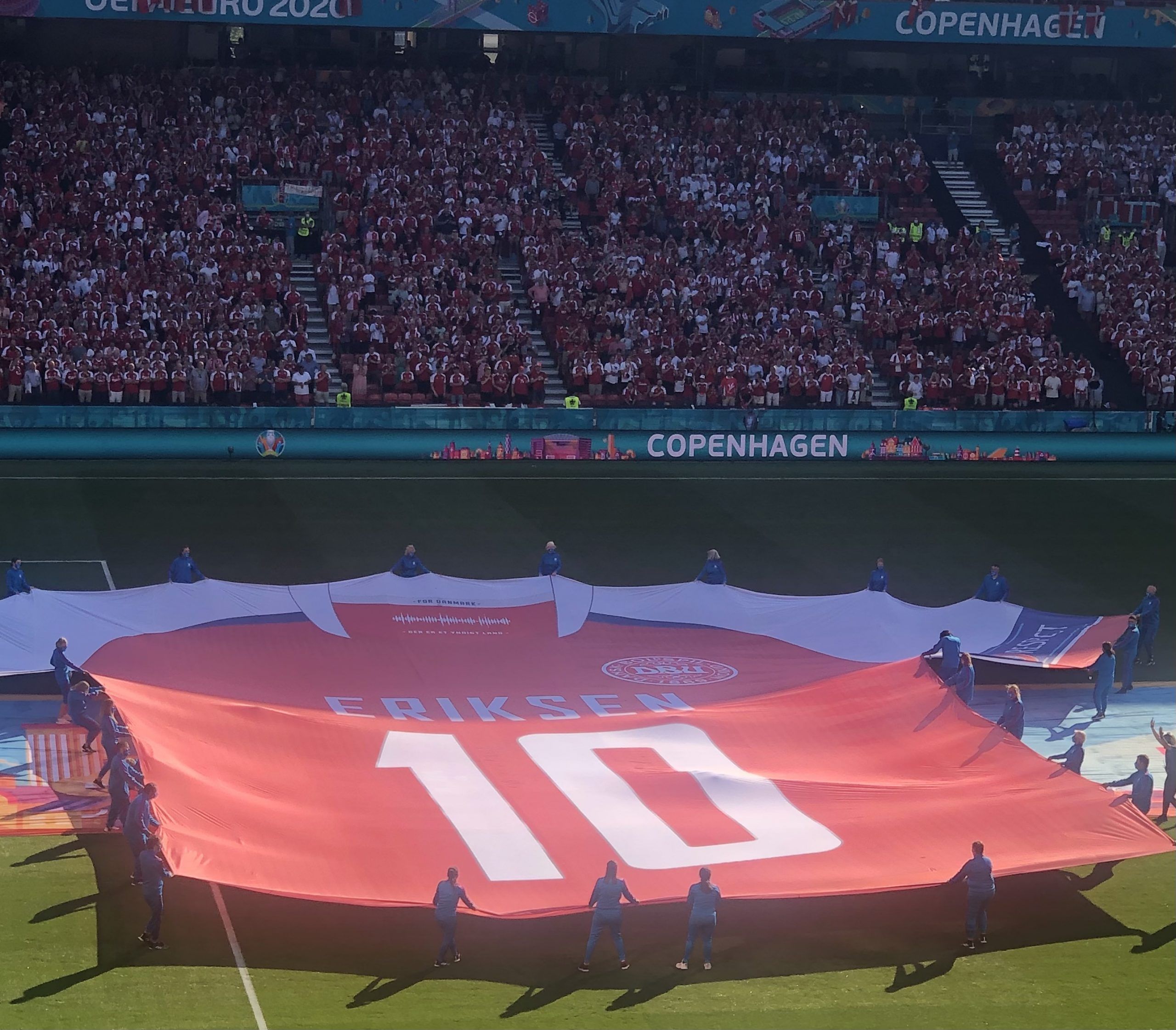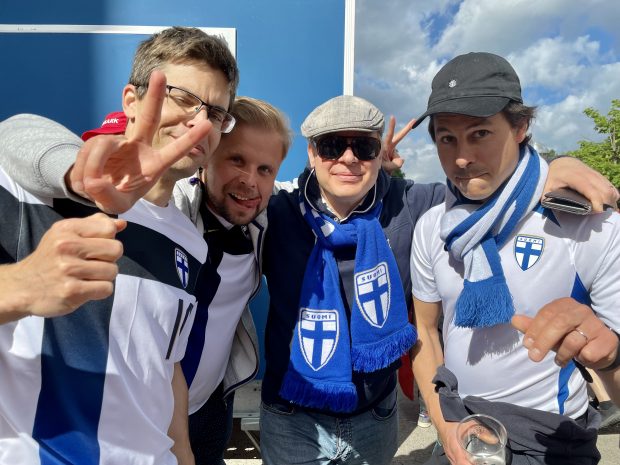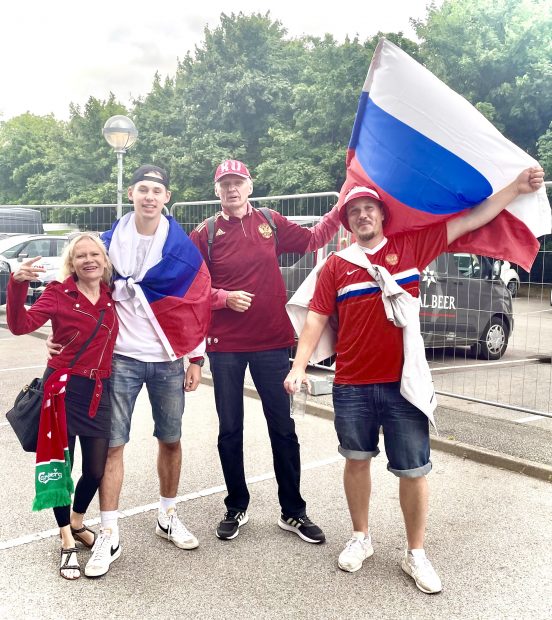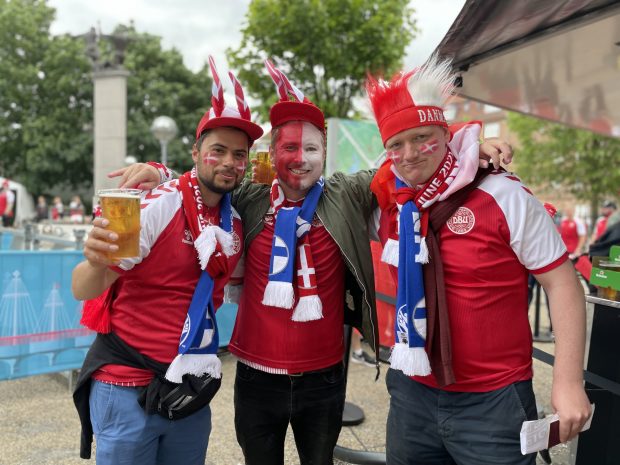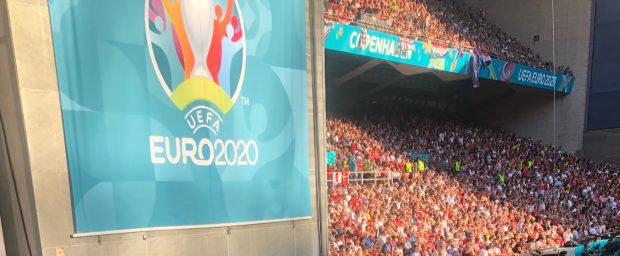Afternoon: Sankt Hans Square in Copenhagen. The area is crawling with people in red and white and beer is being swilled from plastic glasses. They are singing along to the catchy football songs blaring out of the huge loudspeakers in the middle of the square.
A football is kicked into the air and is immediately knocked back by a passing stranger and people slowly start moving towards Parken Stadium about ten minutes away, where the match between Denmark and Finland is to be played.
All Copenhagen is partying and the town is completely turned upside down. The voices of radio and TV commentators are coming through the open windows of cafes talking about the upcoming match, and people are yelling and toasting each other, but amongst the happy Danish football songs a darker note suddenly starts to encroach.
It chimes from a group of Finns dressed in blue and white who appear from round the corner singing their own football anthems with just as much gusto as the Danes are singing theirs. To keep the peace, the police follow the small group of Finnish fans and hold back the traffic so that people can cross towards ‘The Big Green’ without incident.
The Danish roligans gloat openly about thrashing the Finns. They’re wearing claphats and have the Danish flag painted on their faces – and those who haven’t had it done at home stop willingly at random places in the crowd to be painted red and white before the match. There’s a massive enthusiasm for football in the air and, on this lovely summer’s day, while many fans have butterflies in their stomachs, there’s a firm belief that Denmark will win the match.
The winner was life itself
The bells ring and it is time to take your place in the stadium. The match gets underway and fan songs such as ‘We are red, we are white’ and ‘Schmeichel is a wall!’ ring out.
The crowd whistles and hoots in frustration as Finland hold out under a siege, but just minutes before the end of the first-half, the referee calls a halt. A player lies on the ground. He’s not moving. It’s Christian Eriksen, star player and playmaker.
Confusion reigns in the crowd. Was Eriksen kicked? There appeared to be nobody close to him. The entire Denmark team has formed a circle around him: some are faced towards him, some away. The Parken stadium camera reveals some are visibly weeping.
Slowly, the fans, mostly through their phones, establish what’s going on: and it is the worst thing imaginable. Eriksen has had a heart attack; his life hangs in the balance. As he departs for hospital, it is uncertain whether the game should be continued today or tomorrow.
The mood has turned deeply sombre. Grown men are sitting with tears in their eyes and parents are trying to explain the reason for the pause to their children. All supporters, both Danes and Finns, speak in low tones and are almost silent. Nobody knows anything about Christian Eriksen’s condition. The wait for news is unbearable.
Finally, the news comes through that everyone had been hoping for − even praying for. Christian Eriksen has regained consciousness and is going to be okay. He won’t be able to continue playing, of course, but suddenly the result of the game isn’t important anymore. Eriksen was faced with the ultimate challenge … and he won!
Meanwhile, it is decided to let the game continue, which it does, but without the wild outbursts of the crowd and the raucous singing.
The game ends with Finland winning 1-0, but they don’t seem to be terribly happy about the result, which is otherwise one of the greatest victories in Finnish football history ever.
A 1-2 loss against Belgium then leaves Denmark with a mountain to climb.
Magical Danish victory
Despite the somewhat hard baptism of fire, the final group game at Parken is keenly anticipated. Expectations of a Danish victory against Russia are again sky-high and there is much partying and happy days long before the game starts.
Red and white can be seen all over Copenhagen and of course amongst the supporters in Parken. People have dressed up and plastic glasses are littered all over the place. The joy of once again experiencing the Danish Vikings is like an adrenalin rush. With reference to the Danish player Joachim Mæhle, the fans shout slogans such as ‘We’ll Mæhler (maler = paint) Wembley red!’.
The match preliminaries get underway and people find their places, and it seems as if a huge collective intake of breath is taken right across the stadium to sing along with the Danish national anthem ‘Der er et yndigt land’. The whole experience brings out goose-pimples and the thrill generates a feeling of wellness throughout the entire body.
Because of the corona situation there are no fans from outside to back the Russian team. However, a few Russians living in Denmark have dared to show up at the stadium to keep the Russian flag flying high, and that is brave of them because the Danish team play amazingly from the start.
The crowd sends masses of positive vibes to the Danish players. Every time a goal is scored, beer is thrown up in the air with reckless abandon.
We end up standing in beer up to our ankles, completely soaked in the sticky liquid, but truth be told, it is fun to sing along to all the witty and cheeky football songs and not least ‘Sailing up the stream’, an evergreen that we otherwise thought was long since dead and buried.
It is incredibly good fun to take part, and people are holding each other under the arms and singing for all they’re worth.
The game ends with Denmark thrashing Russia 4-1 and reaching the next round. Euphoria reaches new heights and things are really hotting up for a street party. People are dancing and embracing each other and praising one another for what good footballers ‘we’ are, and it seems as if the whole of Denmark is swept along in the excitement of victory.
“Where can we go to drink more? Østerbro or Nørrebro?” ask a couple of tipsy people from Jutland.
“Go to the red-light area in Istedgade,” is the answer given by the Copenhagen Post’s most experienced beer hunter, and the happy lads grin, start to sing Danish pop singer Peter Belli’s ‘Istedgade’, and disappear into the crowd.
Goals en masse
After that amazing party we can’t wait to experience the game between Spain and Croatia, which proves to be somewhat different to the previous matches we’ve seen at Parken.
The atmosphere before the game is just not comparable to that of the other two matches, as it is rather subdued and there is no sensory bombardment of red and white as at the other games. It is almost boring to wander round the stadium and, although it is summer and the weather is good, it feels as if it has become grey and autumnal.
The fans behave well and take their places calmly and quietly. They greet each other in friendly fashion and there are no cheeky chants or football anthems, but as the game gets underway, infectious Spanish rhythms begin to sound out from every nook and cranny.
An enchanting exotic atmosphere spreads as Spain scores goals en masse, but the Croatian team refuses to give up and fights back, as their fans burst out in joyous cries that can be heard a long way away. Now there is shouting and whistling and Parken is once again transformed into a crucible for the two different football cultures that are both going all out to win the game.
The game is a drawn-out affair and after extra time Spain wins 5-3, which unleashes a veritable firework display of a salsa party. Now, beer is flowing freely and the Spanish show that they can do more than just play football – they can also party, flirt and sexily shake their booties.
As neutrals, it’s impossible not to let our hips start swinging and we enjoy taking part in an eight-goal party, which means that the game between Spain and Croatia is the second highest scoring match in Euros history.
One thing is clear: you don’t have to be especially initiated into the rules of football to go to a football match as a spectator. It’s both fun and nerve-wracking and you have to be made of stone not to feel richly entertained. As a curiosity, it can almost be reckoned that matches in Denmark take place without the violence that sometimes mar games in other parts of the world.
At any rate, at these three matches the fans of the losers wished the winners good luck, and partied on with them without any problems.

